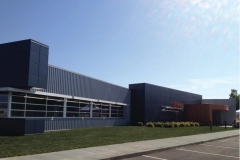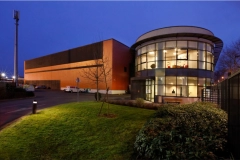Boston’s Rich Tech History Paves the Way for Data Centers
Boston’s Rich Tech History Paves the Way for Data Centers
This week we conclude a special report series on the Boston data center market by looking at some key market updates and the city’s rich tech history.

Get the full report
Establishment of New England cloud and connectivity hub bolsters demand in Boston
Local data storage and low-latency needs from data center users continue to be development catalysts of the Northeast as a regional data center hub. While many larger end user requirements in the Northeast land in Northern Virginia, companies still value the proximity of their IT infrastructure to their offices. As a result, the Northeast is developing as a necessary region needed to house data center operations to support these regional demands. Boston, alongside New Jersey, New York, and Connecticut is transforming into a data processing and communications corridor.
Because downtown areas are typically rich in both power and fiber infrastructure, these areas typically offer converted office buildings providing shell lease opportunities from data center operators.
2H 2021 Boston development activity:
- Digital Realty has accelerated its development of retail colocation and is offering new, full turn-key, scalable solutions beginning Q1 2022
- Lightpath expands regional Boston fiber network
- AWS establishes Boston Local Zone
- Telia expands in Boston with CoreSite
- Markley Group adds Google Cloud Interconnect services
Data center development in Boston finds its way to both the downtown and outer suburbs of the city
This is a trend that is seen in other US markets as well. Because downtown areas are typically rich in both power and fiber infrastructure, these areas typically offer converted office buildings providing shell lease opportunities from data center operators.
Downtown Boston is home to Markley Group’s massive carrier hotel, offering colocation, cloud, and connectivity services in the 920,000 SF facility. The data center provides access to over 80 network providers as well as the Boston Internet Exchange.
Boston is well-insulated from cyclical economic trends due to the high concen- tration of major universities, businesses in the financial services, and established medical and life sciences institutions.
Cogent, CoreSite, and INAP all operate facilities located on Innerbelt Road, which is in close proximity to the downtown area as well.
Providers like Digital Realty and Cyxtera are located in the surrounding suburbs, primarily in Waltham, Needham, and Burlington. Digital Realty is the largest data center operator in Boston, with nearly 20 MW of capacity across three facilities in the suburbs, offering colocation, interconnection solutions, cloud and hybrid solutions.
Boston: A rich tech history and a diverse economy
Boston has a diverse economy, the 8th largest GDP in the US, and an unemployment rate of only 3.7% (compared with 3.9% nationally). These stats alone position the city for sustained long-term viability as a data center market. While cloud platforms and local onramps are allowing companies to do more with less, Boston is poised to continue to benefit from enterprise colocation and regional/edge compute requirements.
Boston is well-insulated from cyclical economic trends due to the high concentration of major universities, businesses in the financial services, and established medical and life sciences institutions. It is also the regional hub for the entire New England area, with major roads, fiber networks, and transportation routes passing through the city.
Boston also has a very rich technology history. Bolt Beranek Newman (BBN) was founded in 1948 by graduates of the Massachusetts Institute of Technology (MIT) and became a computing pioneer that implemented the ARPANET, the predecessor to the Internet. In 1955, Business Week ran an article titled “New England Highway Upsets Old Way of Life” and referred to Route 128 as “the Magic Semicircle”. By 1958, it needed to be widened from four to six lanes, and business growth continued, often driven by technology out of Harvard University and MIT.
 However, the region’s fortunes changed with the emergence of the personal computer, which brought hard times to the minicomputer industry. Massachusetts lost 30,000 tech jobs in the mid-1980s, as the center of gravity in the U.S. tech scene shifted to Silicon Valley. There were some successes, most notably the rise of Lotus Development and its Lotus 1-2-3 spreadsheet and Notes groupware system.
However, the region’s fortunes changed with the emergence of the personal computer, which brought hard times to the minicomputer industry. Massachusetts lost 30,000 tech jobs in the mid-1980s, as the center of gravity in the U.S. tech scene shifted to Silicon Valley. There were some successes, most notably the rise of Lotus Development and its Lotus 1-2-3 spreadsheet and Notes groupware system.
The 1990s saw the rise of EMC Corp., the Hopkinton-based tech firm that became the market leader in data storage. The close of the 1990s saw two MIT researchers launch Akamai Technologies, a pioneer in content distribution to improve the performance of web sites. Akamai remains the market leader
in the CDN sector, with more than 216,000 servers delivering content in 120 countries.
The region has also been a pioneer in robotics, again led by several prominent companies started by MIT scientists. iRobot, which was founded in 1990, has become known for its Roomba consumer vacuum, but has also distinguished itself with military robots that detect and dispose of IED explosives in Iraq and Afghanistan. In 2011, robotics firm Boston Dynamics was acquired by Google, where its quadruped robots have become viral video sensations.
Download the full report, Boston Data Center Market, courtesy of Digital Realty, for an exclusive look at key service providers in the Boston market. The report profiles ten data center operators in the region.
More >> Boston’s Rich Tech History Paves the Way for Data Centers


